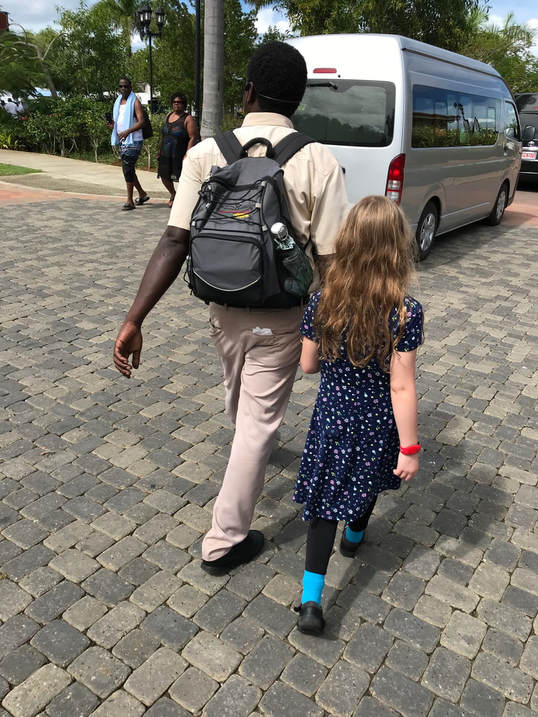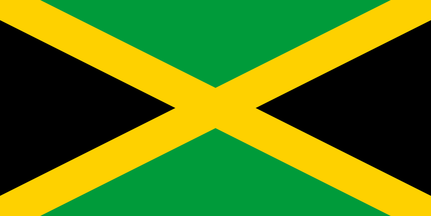|
Hello Everyone, pictured above is Steve. Steve and Evangeline. On a recent vacation we got to spend a day in Jamaica... and it was altogether lovely. The weather was perfect, the food was amazing and the people... well, the people were the friendliest group of folks I've ever had the opportunity to meet. This was on a walking tour, experiencing some of the local food and hearing about the history of the island. The group was engaged and the guides were excellent and the local food was incredible. Here are a few things I learned in Jamaica. 1) Jamaica has some of the purest water in the world. Drinking water... and no, not kidding. The natural state of the fresh water in Jamaica results in incredibly pure and healthy water. In fact, in colonial times, water was a major export in terms of ships refueling and restocking at the ports there. Jamaica is an odd mix of poor and rich. Rich in sunshine, it's basically a tropical paradise. Rich in love, the people there are incredibly warm and welcoming. Rich in culture, their food and art and breathtakingly good. Poor in lots of other ways. Almost 40% of their GDP is tourism, which is a mixed bag. Good during travel season, very, very bad in the months when the cruise ships aren't running. But like an undercurrent of goodness and hope, the water is pure. 2) Jamaican food is quite good. The walking tour we were on was a food tour, trying out a variety of things that the locals actually eat... this was believable because we sat down and ate with a number of people from the city, but not from the tour. That was really fun - and delicious. 3) Jamaican people might be the friendliest people on earth. Yes, I know that a huge amount of their income is from tourism , so this could be seen as self-interest, but I don't think you could feign the reactions and welcome we consistently received. They would ask for our names, and where we were from - and would actually engage in conversation. One of our food stops was in a little cafe and we sat (invited) next to a lady who was working on her teaching plan for school curriculum. She was a treasure, clearly called to love and teach the kids. She and Evangeline hit it off and I was impressed. If a tour in DC just sat down at our table, I'm not sure I would be as hospitable. 4) Jamaicans take an empowerment view to racism. And it's a good approach. Because their local economy is so dependent on tourism, things are tough when the cruise ships aren't running. I wouldn't say that poverty there was extreme, but it was certainly more present than western eyes are used to. In spite of this, their hearts were strong and their spirits, indomitable. One of their local campaigns is, "pushing poverty back" and encourages people to find a way, through cleverness and hard work to make ends meet. One gentlemen we met had a cart, filled with jugs of water. His business? Traveling to local places and washing their car for about $5 US, but he would come to them and do this thing while people were working. Who does that? Someone that has little, but still has hope that effort and ingenuity can make things better. That attitude was pervasive and it certainly left it's mark on me and my family. On this note, Evangeline was the only child in the group... and wasn't feeling very well. Steve, the tour guide was trying to encourage her and make sure that she had a front row seat for things to see and hear and taste. I appreciated that. At some point, we were walking to the next stop and she just took his hand. He was a little surprised, but his response was to smile and walk with her. It became a thing. For the rest of the tour, all walking was done with Steve and Evangeline holding hands. How easy would it be for him to resent us, and our comparative wealth? How easy would it have been for him to endure that for a minute or two then move on? How easy would it have been for him to signal us to keep our kid under control? Instead he embraced the moment and the man has poetry in his soul. It was an act of kindness and shared experience that left a mark on her... and on me. With the current division in our country, political, racial, even between men and women in general... this was a welcome reprieve. 5) You'll never see the Jamaican flag the same way when you understand it's meaning. This is the Jamaican flag: The colors are symbols:
Green for the lush and tropical paradise the island embodies - it's green and beautiful. Yellow for the sun - it's a jewel of the Caribbean - so there you go. Black is for, well, black is for the suffering they have endured as a people... and it's extreme. Jamaica was a major port in colonial times, and was a major port for slavery. Their buildings were built by slaves and there were several violent uprisings and even more violent reprisals. This leads us to the next thing I learned... 6) Jerked Chicken has an interesting beginning. At some point the British plantation owners armed the slaves to help put down a local dispute. When the dispute was over, the now armed slaves decided to not give back the guns and to make a run for it instead. If someone tried to recapture them, they could shoot back. As Steve said a few times, "what would you do?" Same thing, yes. But while they were being hunted, they still needed to eat. And campfires were a give away for their position... so they found ways to cook food underground that wouldn't smoke and would provide food that would travel well for days on a moment's notice. One of the staples was Jamaican Jerked Chicken. It's delicious, but was born from the black color of the flag, and from necessity, not from leisure and love of cooking. 6) William Knibb was a steely eyed missile man. If you haven't heard of William Knibb, check him out here. Knibb was an English Baptist Missionary who planted churches and schools over Jamaica. He is revered and should be. Here's what he thought about slavery: The cursed blast of slavery has, like a pestilence, withered almost every moral bloom. I know not how any person can feel a union with such a monster, such a child of hell. I feel a burning hatred against it and look upon it as one of the most odious monsters that ever disgraced the earth. The iron hand of oppression daily endeavours to keep the slaves in the ignorance to which it has reduced them. Eventually he came back to England to plead the case of the slaves in Scotland, and in England, appearing in 5 months before 200,000 people and eventually before Parliament. One writer, present at those meetings said: Knibb's public addresses had a power altogether overwhelming. Sceptics were convinced, waverers became decided, apathetic people were roused, and great numbers of hearts everywhere kindled to irrepressible support... Knibb's evidence...was so authentic and unassailable that it contributed more than that of any other witness to the conviction of all, that slavery must be speedily abolished. - Peter Masters When slavery was officially abolished in the colonials, Knibb held a special church meeting just before midnight, attended by hundreds of Jamaican slaves. He spoke beautifully in a messaged entitled, "The Monster is Dying" and had one of his parishioners ring the church bell at midnight. As he was speaking, the bell rang out and Knibb stopped his message to ring out as well, crying out, "The Monster is dead!" Can you hear the cheers and celebration of that moment? And then, in a move I love very much, he led everyone outside. They held an impromptu funeral for slavery, putting a pair of shackles in a coffin and they buried it right there in the church yard. He even made a gravestone... which read, "Colonial Slavery died 31 July 1838, Age 276 years." So no one would ever forget. While Steve was telling this story, in front of the church where this happened, I couldn't help but exclaim, "Nice Move!" Steve was amused and agreed that it was, in fact, a nice move. Then Knibb went about the work of building dozens of schools and churches to help the newly emancipated people. He also raised money and purchased land that was given to former slaves, 19,000 of them. Many of those schools and churches are still operating. Steve went to one, along with his classmate, Usain Bolt, the fastest man alive. Oh man. I was blown away. And I understood how Steve could respond as he did to Evangeline. The racism that held them captive for so many generations? Yeah that monster died in 1838. They buried it. You can visit the grave. For Steve, Knibb had it right. You're my brother, you're my sister, I don't care one bit what color your skin is. In some ways they still feel the effects of the evil done to them as a people, but you know what? Their hearts are free. And their smiles come quick and easy, and right from the soul, in Jamaica mon. I was not expecting to find my heart filled with a love and passion for these wonderful people. They are God's children, every one of them - and they get it. The truth is, for all of our sampling of their culture and wonderful food - the thing I'll remember is the lesson they have to teach. That we can be better than we are... that we can overcome evil with good. So what do we do? We join our hearts to the work of William Knibb, and the work of our friend Steve (and Evangeline) and continue to strike the best blow we can against the darkness in our generation. Gear up, my friends, there is good work yet to do!
0 Comments
Leave a Reply. |
Our Writers:At The Surge we love doing things together... that includes writing a blog! Here are a few of our main contributing authors: Greg JohnsonJesus++ Dwaine DarrahOur fearless leader, Dwaine is the lead pastor at The Surge. His experience in counter terrorism with the CIA prepared him for ministry and he likes dogs and babies even more than E does. EE (short for Eric Reiss) is the Wingman at The Surge and likes dogs, music, Mexican food, his wife Karen and his little girl Evangeline... not necessarily in that order. Archives
June 2024
Categories
All
|
|
|
The Surge Community Church
Meeting Sunday Mornings at The State Theatre in Falls Church, 11:10am! Rebroadcast Available Sunday Evenings with SurgeOnDemand, 7:00pm! |



 RSS Feed
RSS Feed
